2014 Syrian presidential election
Presidential elections were held in Syria on 3 June 2014. There is a scholarly consensus that the election was not democratic.[1][2][3]
| ||||||||||||||||||||
| Turnout | 73.42% | |||||||||||||||||||
|---|---|---|---|---|---|---|---|---|---|---|---|---|---|---|---|---|---|---|---|---|
| ||||||||||||||||||||
 | ||||||||||||||||||||
| ||||||||||||||||||||
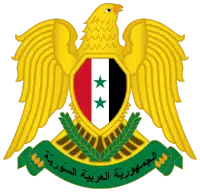 |
|---|
| This article is part of a series on the politics and government of Syria |
|
|
|
|
Because of the Syrian Civil War which began in March 2011, Syria has the largest refugee population in the world and voting for refugees in certain foreign countries began at Syrian embassies several days before voting in Syria.[4] Domestic and foreign-based Syrian opposition groups boycotted the election and the vote did not take place in large parts of Syria under rebel control.[4][5][6] The areas under Kurdish militia control also did not allow voting due to the refusal of the government to recognize their claim for regional autonomy, though some people traveled to government–controlled areas to vote.[7]
Some rebel groups vowed to disrupt the elections in any way possible, including bombing and shelling polling stations and government-controlled areas.[8][9][10] Another statement, issued by the Ajnad al-Sham Islamic Union, the Sham Corps, the Army of Mujahedeen and the Islamic Front, said they would not attack voters but warned people to stay at home "in case the Syrian government did"; there were 50 reported deaths from the shelling by the rebels.[11]
Bashar al-Assad was sworn in for his third seven-year term on July 16, 2014 in the presidential palace in Damascus.[12] The Gulf Cooperation Council, the European Union and the United States decried the election as illegitimate.[13][14][15][16] Members of this coalition have been condemned by supporters of Assad for supposedly precipitating the civil war through what they claim is the invasion of Syria which is illegal under international law, the UN charter and for providing material and financial support for the terrorist groups.[17][18][19][20][21][22]
Attempts to hold an election under the circumstances of a civil war were criticized by UN secretary general Ban Ki-moon and it was widely reported that the elections lacked independent election monitoring.[23][24]
Background
Since 2011, the country has been plagued by the Syrian Civil War that has factionalised the population largely, but not entirely, along sectarian religious and/or ethnic grounds. The UK-based Syrian Observatory for Human Rights states that the war has claimed over 150,000 lives.[25] One third of the country's population of 23 million[26] (some 7 million) have been displaced, with 2.5 million as refugees in foreign countries.[27]
A Spokesperson for the United Nations Secretary General Ban Ki-moon warned that amid the ongoing Syrian Civil War and large-scale displacement of Syrian citizens, "such elections are incompatible with the letter and spirit of the Geneva communiqué" and would "damage prospects of a political solution with the opposition. We will, nonetheless, continue to search and build upon any opening to a solution to the tragedy in Syria."[23][28] Syrian Rebels and opposition parties refused to attend the peace conference (the ultimate goal of the Geneva communiqué) unless Assad was removed from power and barred from any future leadership position. The peace talks had failed before they ever began because what was intended to be a negotiation became only an ultimatum. The derailment of the Peace talks is in stark contrast to the stated goals of the UN towards resolving the conflict.[29][30]
Refugees
The 2.5 million refugees and their ability to vote has resulted in several controversies surrounding this election. Hundreds of thousands of refugees who did not leave Syria officially via border posts have been excluded from voting.[27]
In Beirut, Lebanon, which hosts some 1.1 million Syrian refugees, the roads were paralyzed because of the huge number of Syrian refugees and Syrian expatriates already living in Lebanon that wanted to vote at the embassy.
Expatriate voting
.jpg.webp)
Permitted
Syrian expatriates were able to vote in the Syrian embassies of the following nations:[31][32][33][34]
Refused
The following ten countries did not allow expatriate voting to be held in the Syrian diplomatic missions. In order to allow voters to participate in the elections following the ban, the Syrian government encouraged Syrian expatriates to fly back to their home country and cast their votes.[35] Those foreign governments' decisions were welcomed by the Syrian National Council, a Syrian opposition organization and an opponent of Bashar al-Assad.[4][36]
Electoral system
The new constitution, adopted following the 2012 Syrian constitutional referendum, has changed the nature of the Presidential election from a referendum to a multi-candidate electoral ballot. As a result, this election marks the first time that candidates can challenge the incumbent President; the first nominally democratic election in Syria's history. A law adopted by the Syrian parliament in early 2014 restricts candidacy to individuals who have lived in Syria for the past ten years, thereby preventing exiled people from running.[37]
On 8 April Syrian Information Minister Omran Zoabi announced that candidates will be able to submit their applications during the last ten days of April. Zoabi insisted that despite the ongoing civil war that the election would proceed on schedule, and wouldn't be delayed for any reason. Zoabi also claimed that the "overwhelming majority" of Syrians wished to see incumbent President Bashar al-Assad re-elected.[37] Zoabi also claimed that government military operations would continue despite the election.[38]
Eligibility criteria
The conditions required to be a candidate in a presidential election are the following according to the Syrian constitution:[39]
- A candidate must have the support of at least 35 or more members of the parliament
- A candidate must be at least 40 years old
- A candidate must be Syrian by birth, of parents who are Syrians by birth
- A candidate must enjoy civil and political rights and not convicted of a dishonorable felony, even if he was reinstated
- A candidate must not be married to a non-Syrian spouse
- A candidate must have lived in Syria for 10 years before the election
Candidates
A total of 24 candidates, including 2 women and a Christian, submitted applications to the Supreme Constitutional Court for the presidency.[40][41][42] Of these, two candidates other than Assad met all the conditions to run, including the support of 35 members of the parliament.[43] The two other candidates chosen to run are seen as "mostly symbolic contenders" and "little known figures".[4]
- Bashar al-Assad, the incumbent president, leader of Ba'ath Party
- Hassan Abdullah al-Nouri, from the National Initiative for Administration and Change in Syria, a 54-year-old MP from Damascus
- Maher Abd Al-Hafiz Hajjar, formerly from the People's Will Party, a 43-year-old MP from Aleppo. This party is led by veteran opposition leader Qadri Jamil who supported the initial protests in 2011 but then described calls for the overthrow of the government as "unrealistic and useless". Jamil was a member of the committee that drafted the new Constitution of Syria in 2011. However, People's Will won just two of 250 MPs in the 2012 parliamentary election with their allies from the Syrian Social Nationalist Party won a further four. Jamil was nominated Deputy Prime Minister by President Assad in June 2012 but was removed in October 2013. The small number of MPs from the party indicates that most of his nominations must have come from either independents or MPs from the ruling National Progressive Front. A statement from the People's Will Party on 27 April distanced the party from Hajjar, claiming that Hajjar was no longer a member of either the People's Will Party, or the Popular Front for Liberation and Change. Instead the statement claimed that Hajjar represented only himself.[44]
The other 21 candidates that did not meet the criteria were:[45]
- Sawsan Omar al-Haddad, born in Latakia Governorate in 1963. (woman)
- Sameer Ahmad Mo'alla, born in Quneitra Governorate in 1961.
- Mohammad Firas Yassin Rajjouh, born in Damascus in 1966.
- Abdul-Salam Youssef Salameh, born in Homs governorate in 1971.
- Ali Mohammad Wannous, born in Homs in 1973.
- Azza Mohammad Wajih al-Hallaq, born in Damascus in 1962. (woman)
- Talie Saleh Nasser, born in Kafrin in 1967.
- Samih Mikhael Mousa, born in Btaiha in 1963. (Christian)
- Mahmoud Khalil Halbouni, born in Harasta in 1946.
- Mohammad Hassan al-Kanaan, born in al-Sanamayn in 1964.
- Khaled Abdo al-Kreidi, born in al-Al in 1966.
- Basheer Mohammad al-Balah, born in Damascus in 1931.
- Ahmad Hassoun al-Abboud, born in Mayadin in 1962
- Ayman Shamdin al-Issa Alam, born in al-Husseinyeh in 1967.
- Ziad Adnan Hakawati, born in Damascus in 1955.
- Ahmad Ali Qsei’eh, born in Jabaq in 1951.
- Mahmoud Mohammad Nassr, born in Zahiriye in 1969.
- Ali Hassan al-Hassan, born in Deir Saras in 1965.
- Ahmad Omar Dabba, born in Tazeh Shamaliye in 1969.
- Mahmoud Naji Moussa, born in Tadmur in 1950.
- Hossein Mohammad Tijan, born in Aleppo in 1961.
Results
The Supreme Constitutional Court announced on Wednesday 4 June that turnout for the election was 73.42%, with 11,634,412 of the 15,845,575 Syrians eligible to take part voting. The number for Syrians eligible to vote is based on the government’s data of all Syrians living in Syria and abroad over the age of 18; this includes all Syrians in government-held territory, rebels-held territory, refugees, newly naturalized Kurds, and declared Syrian expatriates.
The number of invalid papers was 442,108, or 3.8%. Majed Khadra, the Spokesperson of the Supreme Constitutional Court, also announced that the losing candidates and individuals with complaints about the electoral process had 3 days to submit their appeals. He stated that the court would decide the final outcome in the 7 days following the three-day appeal period, and then would announce the name of the declared winner by means of the Speaker of the People's Assembly.[46] The same day the Speaker of the People's Assembly, Mohammad Jihad al-Laham, announced the raw data results.[47]
| Candidate | Party | Votes | % | |||
|---|---|---|---|---|---|---|
| Bashar al-Assad | Ba'ath Party | 10,319,723 | 88.7 | |||
| Hassan al-Nouri | NIACS | 500,279 | 4.3 | |||
| Maher Hajjar | Independent | 372,301 | 3.2 | |||
| Invalid/blank votes | 442,108 | 3.8 | ||||
| Total | 11,634,412 | 100 | ||||
| Registered votes/turnout | 15,845,575 | 73.42 | ||||
| Source: SANA (WA), SANA (WA) | ||||||
Andrew Gelman suggested that the results could be fabricated based on the unlikely accurate numbers.[48] For example, 10,319,723/11,634,412 = 0.886999962, so the 88.7% number for Bashar al-Assad is correct to the nearest single voter. Similarly, the proportion for NIACS comes out at 0.042999938 and for the Independent party at 0.031999985.
But whilst Gelman's argues that the published counts were fabricated, he admits that it does not preclude the theory that those numbers could have been generated retrospectively (and unprofessionally) from valid percentages.
The proportion reported for turnout, 0.734237287, does not exhibit the unusual property found in the vote counts.
Election observers
The Syrian government said election monitors would not be from the United States, European Union, or the Organization for Security and Co-operation in Europe, but other observers would be present.[49] There were no independent election monitors for the election,[24] but an international delegation did observe the election. It was reported to have included representatives from more than 30 countries including Brazil,[50] India,[51] Iran,[52][50] Russia,[52][50] Uganda,[50] the US,[53] and Venezuela.[50] Other delegates expected to join were from China, South Africa, Cuba, Nicaragua, Bolivia, Ecuador and Canada.[51] Among the delegates were Iran's Alaeddin Boroujerdi,[52] Alexey Alexandrov of Russia's ruling United Russia,[52] William Fariñas of Venezuela's ruling United Socialist Party of Venezuela,[54] Benna Namugwanya Bugembe of Uganda's ruling National Resistance Movement,[50] Brazilian Socorro Gomes of the Communist World Peace Council,[54] blogger Jane Stillwater,[53] Judy Bello and Scott Williams of the Workers World Party,[53] Joe Iosbaker of Freedom Road Socialist Organization/FightBack!,[53] Indian anti-Zionist activist Feroze Mithiborwala,[51] and US-based pro-Assad activist Paul Larudee.[53][55]
Reactions
Domestic
.jpg.webp)
- Hassan al-Nouri held a press conference at the Damascus Sheraton Hotel where he congratulated President Assad for "winning confidence of the Syrian people through winning the presidential elections." Nouri said that the electoral process had been clear and transparent to the entire world, adding that both he and his representatives had inspected the vote counting. Nouri also criticised those who had called for a boycott and claimed instead that the election could do no harm or good to the Syrian people. He ended his speech stating: "I promise I was a patriotic candidate who takes part in building Syria and will be a soldier behind the Syrian Arab Army."[56]
- Patriarch of Antioch of the Syriac Orthodox Church Ignatius Aphrem II said that the success of the presidential election in Syria and the victory of President Bashar al-Assad was a victory for all honest Syrian citizens. In a letter of congratulation, he expressed his sincere congratulations to al-Assad for winning the election and praying to God to help and guide him in his work.[57]
Expressions of concern
 United Kingdom – Foreign Secretary William Hague said: "Assad lacked legitimacy before this election, and he lacks it afterwards. This election bore no relation to genuine democracy. It was held in the midst of civil war." [58]
United Kingdom – Foreign Secretary William Hague said: "Assad lacked legitimacy before this election, and he lacks it afterwards. This election bore no relation to genuine democracy. It was held in the midst of civil war." [58] United States – State Department spokeswoman Marie Harf at daily press briefing: "Today’s presidential election in Syria is a disgrace. Bashar al-Assad has no more credibility today than he did yesterday. In a country where there is not a free society, this selection process is a inconceivable situation," she said.[59][60]
United States – State Department spokeswoman Marie Harf at daily press briefing: "Today’s presidential election in Syria is a disgrace. Bashar al-Assad has no more credibility today than he did yesterday. In a country where there is not a free society, this selection process is a inconceivable situation," she said.[59][60]- Friends of Syria (a group founded by then-French president Nicolas Sarkozy) denounced the election, alleging beforehand that it would be rigged and adverse to the premise behind the Geneva II talks. The group also questioned the veracity of an election given it would be run in the middle of a civil war and only within government areas "thereby meaning that millions of Syrians unable to vote as a result of the war either due to being in areas outside government control or due to being displaced."[61]
The Gulf Cooperation Council, the European Union and the United States all decried the election as illegitimate and a farce.[62] State employees were told to vote or face interrogation.[63] On the ground there were no independent monitors stationed at the polling stations.[64] As few as 6 million eligible voters remained in Syria.[65][66] Due to rebel, Kurdish and ISIS control of Syrian territories there was no voting in roughly 60% of the country.[67]
Expressions of congratulations
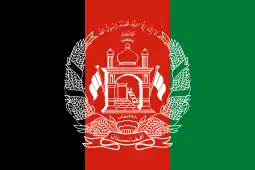 Afghanistan - Afghan President Hamed Karzai expressed hope that Syria will overcome all challenges "thanks to the wisdom of its leadership and the determination of the Syrian people". He affirmed support to Syria in "combating terrorism and extremism," considering President al-Assad’s presidential elections win as “a new chapter that paves the way for ending the crisis in Syria."[68]
Afghanistan - Afghan President Hamed Karzai expressed hope that Syria will overcome all challenges "thanks to the wisdom of its leadership and the determination of the Syrian people". He affirmed support to Syria in "combating terrorism and extremism," considering President al-Assad’s presidential elections win as “a new chapter that paves the way for ending the crisis in Syria."[68]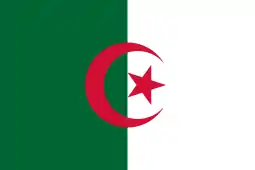 Algeria – President of Algeria Abdelaziz Bouteflika sent a cable of congratulations to President of Syria, Bashar al-Assad, on the occasion of winning the presidential elections. President Bouteflika expressed, in his cable, best wishes for further progress and prosperity to the brotherly people of Syria.[69]
Algeria – President of Algeria Abdelaziz Bouteflika sent a cable of congratulations to President of Syria, Bashar al-Assad, on the occasion of winning the presidential elections. President Bouteflika expressed, in his cable, best wishes for further progress and prosperity to the brotherly people of Syria.[69]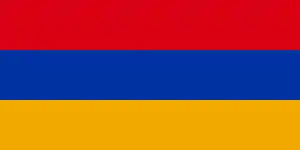 Armenia - President Serzh Sargsyan hoped that Syria will manage to re-establish peace and stability through a national dialogue in the name of the well-being and prosperity of the Syrian people. "I wish you [Bashar al-Assad] good health and successes and I wish the friendly Syrian people eternal peace."[70]
Armenia - President Serzh Sargsyan hoped that Syria will manage to re-establish peace and stability through a national dialogue in the name of the well-being and prosperity of the Syrian people. "I wish you [Bashar al-Assad] good health and successes and I wish the friendly Syrian people eternal peace."[70] Belarus - In a cable of congratulation, Belarusian President Alexander Lukashenko "expressed keenness to strengthen and develop bilateral relations between Belarus and Syria in all fields for the benefit of the two peoples."[71]
Belarus - In a cable of congratulation, Belarusian President Alexander Lukashenko "expressed keenness to strengthen and develop bilateral relations between Belarus and Syria in all fields for the benefit of the two peoples."[71] Brunei - Sultan Hassanal Bolkiah expressed wishes for Syria to continue its advancement and his "desire to work with President al-Assad to develop cooperation and friendship ties between the two countries." Further stressing that "the Syrians’ massive turnout to polls rendered futile all attempts to fracture Syria and tear the Syrians’ unity apart. The Syrian people, by their vigorous participation in the elections, have expressed commitment to national firm principles and spoken out loud against terrorism that has plagued their country."[72]
Brunei - Sultan Hassanal Bolkiah expressed wishes for Syria to continue its advancement and his "desire to work with President al-Assad to develop cooperation and friendship ties between the two countries." Further stressing that "the Syrians’ massive turnout to polls rendered futile all attempts to fracture Syria and tear the Syrians’ unity apart. The Syrian people, by their vigorous participation in the elections, have expressed commitment to national firm principles and spoken out loud against terrorism that has plagued their country."[72] Cuba - Cuban President Raul Castro expressed hope that Syria will overcome all challenges "thanks to the wisdom of its leadership and the determination of the Syrian people." He stressed that "the victory of President al-Assad is a victory for all honest and free people who bravely supported Syria in face of the foreign conspiracies and war imposed on it".[68]
Cuba - Cuban President Raul Castro expressed hope that Syria will overcome all challenges "thanks to the wisdom of its leadership and the determination of the Syrian people." He stressed that "the victory of President al-Assad is a victory for all honest and free people who bravely supported Syria in face of the foreign conspiracies and war imposed on it".[68]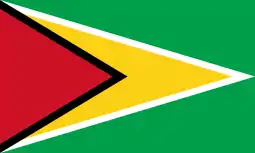 Guyana – President of Guyana Donald Ramotar said in his cable of congratulations to President of Syria, Bashar al-Assad, that al-Assad's win in the presidential election is a great victory for Syria, expressing his wishes for continuing friendship relations between both countries and coordinating common positions on regional and international issues.[73]
Guyana – President of Guyana Donald Ramotar said in his cable of congratulations to President of Syria, Bashar al-Assad, that al-Assad's win in the presidential election is a great victory for Syria, expressing his wishes for continuing friendship relations between both countries and coordinating common positions on regional and international issues.[73] Iran – The Foreign Ministry published a statement that read: "All impartial foreign observers described this election as free and in a calm atmosphere. The Syrian people picked (Assad) with an overwhelming (88.7%) of votes. The Syrian people’s will overpowered America’s….This is the fruit of the Syrian people’s three years of resistance."[74] A statement from Alaeddin Boroujerdi, head of the Iranian Parliament's Committee on National Security, said the election "happened in its constitutional time and date in a transparent democratic way."[52]
Iran – The Foreign Ministry published a statement that read: "All impartial foreign observers described this election as free and in a calm atmosphere. The Syrian people picked (Assad) with an overwhelming (88.7%) of votes. The Syrian people’s will overpowered America’s….This is the fruit of the Syrian people’s three years of resistance."[74] A statement from Alaeddin Boroujerdi, head of the Iranian Parliament's Committee on National Security, said the election "happened in its constitutional time and date in a transparent democratic way."[52] Hezbollah – "The elections proved that a political solution in Syria begins and ends with President Bashar al-Assad. There is a president who has been elected by millions for a new seven-year term. Those who want to work for a political solution must talk to him, negotiate with him and reach a solution with him. We call on combatants ... to move towards reconciliation and dialogue, looking for political exits to stop the bloodshed. This fighting will only increase destruction in your country and add to the bloodshed. Everyone should recognise and acknowledge that war in Syria will not lead to others taking control of it."[75]
Hezbollah – "The elections proved that a political solution in Syria begins and ends with President Bashar al-Assad. There is a president who has been elected by millions for a new seven-year term. Those who want to work for a political solution must talk to him, negotiate with him and reach a solution with him. We call on combatants ... to move towards reconciliation and dialogue, looking for political exits to stop the bloodshed. This fighting will only increase destruction in your country and add to the bloodshed. Everyone should recognise and acknowledge that war in Syria will not lead to others taking control of it."[75]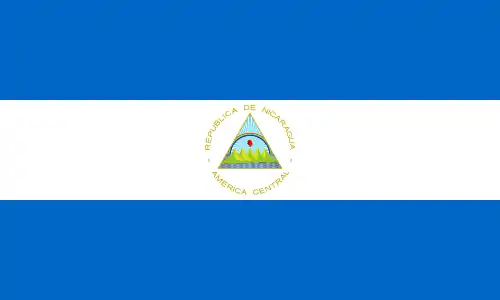 Nicaragua - President Daniel Ortega said he "want[ed] to congratulate him on his resounding victory in the presidential election on Tuesday June 3. Their victory, brother President Bashar represents a reaffirmation of the commitment to peace and spirit of the Syrian people, has defended you with chivalry."[76]
Nicaragua - President Daniel Ortega said he "want[ed] to congratulate him on his resounding victory in the presidential election on Tuesday June 3. Their victory, brother President Bashar represents a reaffirmation of the commitment to peace and spirit of the Syrian people, has defended you with chivalry."[76] North Korea - Supreme Leader Kim Jong-Un sent a congratulatory message to Bashar Al-Assad upon his re-election as president of Syria. The message extended warm congratulations to him upon his re-election as president of Syria thanks to the support and trust of the Syrian people.[77]
North Korea - Supreme Leader Kim Jong-Un sent a congratulatory message to Bashar Al-Assad upon his re-election as president of Syria. The message extended warm congratulations to him upon his re-election as president of Syria thanks to the support and trust of the Syrian people.[77]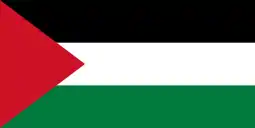 Palestine - President Mahmoud Abbas said that electing President al-Assad means "preserving Syria’s unity and sovereignty and that it will help end the crisis and confront terrorism, wishing prosperity and safety to Syria".[78]
Palestine - President Mahmoud Abbas said that electing President al-Assad means "preserving Syria’s unity and sovereignty and that it will help end the crisis and confront terrorism, wishing prosperity and safety to Syria".[78] Russia - Foreign Ministry spokesman Alexander Lukashevich sees the vote as an important event that safeguards the continued functioning of state institutions in Syria. The election was "naturally not 100 percent democratic" due to the conflict in Syria, but that turnout, transparency and the findings of foreign monitors "give us no reason to question the legitimacy of the election". "Against this background, the (...) politicised reaction to the election from some of our international partners cannot fail to cause disillusionment". "It is unacceptable to ignore the views of millions of Syrians."[79]
Russia - Foreign Ministry spokesman Alexander Lukashevich sees the vote as an important event that safeguards the continued functioning of state institutions in Syria. The election was "naturally not 100 percent democratic" due to the conflict in Syria, but that turnout, transparency and the findings of foreign monitors "give us no reason to question the legitimacy of the election". "Against this background, the (...) politicised reaction to the election from some of our international partners cannot fail to cause disillusionment". "It is unacceptable to ignore the views of millions of Syrians."[79]
- Patriarch of Moscow and all Rus' of the Russian Orthodox Church Kirill congratulated President of Syria Bashar al-Assad for his win in recent presidential elections. In his cable, Patriarch Kirill said he is sure that "centuries-long national accord and fraternity in Syria will motivate the establishment of stability and peace there." He wished President al-Assad more courage and strength to steer Syria through the current stage and bring back security and stability, hoping that the Syrian people will see peace and stability.[80]
 Somalia - The embassy of Somalia congratulated the Syrian people on President Bashar al-Assad’s win of the presidential elections held on June 3 in Syria. It expressed Somalia’s keenness on bolstering the fraternal ties between Somalia and Syria in the interests of the two peoples. Somalia hopes that the Syrian people will restore security, stability, amity and civil peace.[81]
Somalia - The embassy of Somalia congratulated the Syrian people on President Bashar al-Assad’s win of the presidential elections held on June 3 in Syria. It expressed Somalia’s keenness on bolstering the fraternal ties between Somalia and Syria in the interests of the two peoples. Somalia hopes that the Syrian people will restore security, stability, amity and civil peace.[81] South Africa - President Jacob Zuma congratulated Bashar al-Assad on winning the presidential elections. He voiced hope that the Syrian people and government will overcome the crisis affecting their country, affirming South Africa’s readiness to help in this regard.[82]
South Africa - President Jacob Zuma congratulated Bashar al-Assad on winning the presidential elections. He voiced hope that the Syrian people and government will overcome the crisis affecting their country, affirming South Africa’s readiness to help in this regard.[82] Venezuela - President Nicolás Maduro congratulated the Syrian people and President Assad on the election results. Additionally, President Maduro reiterated his "full support for the Syrian people in their struggle for peace" and condemned "the destabilising mercenary actions that still remain in Syria, with the encouragement of NATO member countries."[83]
Venezuela - President Nicolás Maduro congratulated the Syrian people and President Assad on the election results. Additionally, President Maduro reiterated his "full support for the Syrian people in their struggle for peace" and condemned "the destabilising mercenary actions that still remain in Syria, with the encouragement of NATO member countries."[83]
See also
References
- Cheeseman, Nicholas (2019). How to Rig an Election. Yale University Press. pp. 140–141. ISBN 978-0-300-24665-0. OCLC 1089560229.
- Norris, Pippa; Martinez i Coma, Ferran; Grömping, Max (2015). "The Year in Elections, 2014". Election Integrity Project.
The Syrian election ranked as worst among all the contests held during 2014.
- Jones, Mark P (2018). Herron, Erik S; Pekkanen, Robert J; Shugart, Matthew S (eds.). "Presidential and Legislative Elections". The Oxford Handbook of Electoral Systems. doi:10.1093/oxfordhb/9780190258658.001.0001. ISBN 9780190258658. Retrieved 2020-05-21.
unanimous agreement among serious scholars that... al-Assad's 2014 election... occurred within an authoritarian context.
- "Syrian expats in Lebanon flock to vote for Assad". CBS News. May 29, 2014. Retrieved May 29, 2014.
- "Assad's Win Is Assured, but Limits Are Exposed". The New York Times. Retrieved 19 February 2015.
- Iran Guards commander killed in Syria: reports
- Wladimir van Wilgenburg. "Syria's Kurdish region to boycott presidential elections". Al-Monitor. Archived from the original on June 7, 2014. Retrieved June 8, 2014.
- "Syrians flee as rebels vow to wreck poll". The Times. June 3, 2014. Retrieved June 8, 2014.
- "Syria election: A ballot amid a battle". Worldnews.com. June 3, 2014. Retrieved June 8, 2014.
- "5 things to know about Tuesday's presidential election in Syria". Macleans. June 2, 2014. Retrieved June 8, 2014.
- Edward Dark. "Rebels shell Aleppo as Syria votes". Al-Monitor. Retrieved June 8, 2014.
- "Al Assad sworn in in 'farcical' inauguration". gulfnews.com. AFP. 16 July 2014. Retrieved 13 March 2015.
- "Arab League criticizes Syrian election plan". Reuters. Retrieved 19 February 2015.
- GCC slams Syrian elections as ‘farce’ Archived June 6, 2014, at the Wayback Machine
- "Syria election: Bashar al-Assad re-elected president in poll with 'no legitimacy'". ABC. June 4, 2014. Retrieved June 8, 2014.
- Sam Tarling (Jun 5, 2014). "Inside Aleppo: the people refusing to leave Syria's shattered city". Telegraph. Retrieved June 8, 2014.
- "A Bitter Pill To Swallow: Connections Between Captagon, Syria, And The Gulf". Columbia Journal of International Affairs. Retrieved 15 December 2016.
- "Arming Syrian rebels: Where the US went wrong". BBC News. Retrieved 15 December 2016.
- "U.S. Support for Al Qaeda-Linked Rebels Undermines Syrian Ceasefire". Retrieved 15 December 2016.
- "The U.S. Has Delivered Ammunition to Syrian Rebels Fighting ISIS". Retrieved 15 December 2016.
Military officials have not yet confirmed what type of ordnance was sent or who exactly received it, according to Reuters.
- "The Provision of Arms and 'Non-lethal' Assistance To Governmental And Opposition Forces" (PDF). University of New South Wales Law Journal. Archived from the original (PDF) on 19 February 2017. Retrieved 15 December 2016.
the ICJ has continuously held, there is no ‘right for States to intervene, directly or indirectly, with or without armed force, in support of an internal opposition in another State
- "British aircraft took part in air strike that killed dozens of Syrian soldiers, Ministry of Defence confirms". The Independent. Retrieved 15 December 2016.
- "Syrian election will undermine political solution: U.N.'s Ban". Mobile.reuters.com. Retrieved June 4, 2014.
- Sly, Liz; Ramadan, Ahmed (June 3, 2014). "Syrian election sends powerful signal of Assad's control". The Washington Post. Retrieved September 3, 2016.
- "Death toll in Syria's civil war above 150,000: monitor". Reuters.com. April 1, 2014. Retrieved June 4, 2014.
- "Obama: Syrian opposition needs more support". Washingtonpost.com. Retrieved June 4, 2014.
- Barnard, Anne (May 28, 2014). "Syrians in Lebanon Flood Polling Place, Choosing Assad Out of Fervor or Fear". New York Times. Retrieved May 29, 2014.
- "Daily Press Briefing by the Office of the Spokesperson for the Secretary-General". United Nations. April 21, 2014. Retrieved December 23, 2016.
- "What is the Geneva II conference on Syria?". BBC World News. January 22, 2014. Retrieved December 23, 2016.
- "Main Syrian rebel groups declare opposition to Geneva peace talks". NBC News. October 27, 2013. Retrieved December 23, 2016.
- "Assad's supporters abroad vote in Syrian election". The Washington Post. Associated Press. May 28, 2014. Retrieved June 8, 2014.
- "FAQs: Presidential elections during civil war". DW.DE. June 3, 2014. Retrieved June 8, 2014.
- "Syria news". SANA. Syrian Arab News Agency. May 26, 2014. Archived from the original on June 6, 2014. Retrieved June 8, 2014.
- "Syrians abroad elect their president amid high voter turnout, voting extended until midnight, and one more day in Lebanon". SyriaOnline.sy. Retrieved June 8, 2014.
- "Ex-pat Syrians flock to vote in Lebanon -- while the West forbids them - rabble.ca".
- "Syrian refugees stranded and unable to vote". DW.DE. June 3, 2014. Retrieved June 8, 2014.
- "Presidential candidacy to open this month: minister | News , Middle East". The Daily Star. Retrieved June 4, 2014.
- "Syrian presidential election will not be delayed - minister". swissinfo.ch. April 8, 2014. Archived from the original on April 13, 2014. Retrieved June 4, 2014.
- "Syrian constitution, articles 84 and 85" (PDF). Syria. February 26, 2012. Retrieved June 19, 2017.
- Syrian Arab News Agency: SANA, Damascus Syria - syria news (April 30, 2014). "Syrian Arab news agency - SANA - Syria : Syria news ::". Sana.sy. Archived from the original on June 12, 2014. Retrieved June 4, 2014.
- Syrian Arab News Agency: SANA, Damascus Syria - syria news (May 1, 2014). "Syrian Arab news agency - SANA - Syria : Syria news ::". Sana.sy. Archived from the original on June 12, 2014. Retrieved June 4, 2014.
- Syrian Arab News Agency: SANA, Damascus Syria - syria news (May 1, 2014). "Syrian Arab news agency - SANA - Syria : Syria news ::". Sana.sy. Archived from the original on May 4, 2014. Retrieved June 4, 2014.
- "Assad to face 2 others in Syrian presidential poll". May 4, 2014.
- "تصريح ناطق رسمي باسم حزب الإرادة الشعبية - جريدة قاسيون". Kassiounpaper.com. Archived from the original on October 9, 2017. Retrieved June 4, 2014.
- "Syria news". SANA. Syrian Arab News Agency. April 27, 2014. Archived from the original on May 1, 2014. Retrieved June 8, 2014.
- "Supreme Constitutional Court: Number of participants in Presidential elections reached at 11.634.412 with 73.42%". SANA. Damascus. June 4, 2014. Archived from the original on June 7, 2014. Retrieved June 4, 2014.
- "Dr. Bashar Hafez al-Assad wins post of President of Syria with sweeping majority of votes at 88.7%". SANA. Damascus. June 4, 2014. Archived from the original on June 6, 2014. Retrieved June 4, 2014.
- "Why it's pretty obvious the Syria vote totals are fabricated". Washington Post. Retrieved 20 November 2014.
- "Syrian President al-Assad re-elected easily, state media reports". CNN. June 4, 2014.
- "Foreign delegation in Syria slams West, endorses elections". The Times of India. Retrieved June 8, 2014.
- Indian Delegation to monitor Syria election on June 3, Kohraam News, June 2, 2014]
- "Kerry calls Syrian presidential vote 'meaningless'". Al Jazeera America. 4 June 2014. Retrieved 3 September 2016.
- Caleb Maupin "Syria election observers at UN: Elections ‘big defeat’ for U.S.", Workers World June 24, 2014
- Telesur (June 4, 2014). "International observers say Syrian elections were transparent". Archived from the original on 6 June 2014. Retrieved 9 March 2018 – via lainfo.es.
- Amended ethics filing shows Dennis Kucinich was paid $20k by pro-Syrian government group Cleveland.com
- "Presidential Candidate al-Nouri congratulates Dr. Bashar al-Assad for "winning confidence from Syrian people"". SANA. Damascus. June 5, 2014. Archived from the original on June 6, 2014. Retrieved June 5, 2014.
- "الوكالة العربية السورية للأنباء - Syrian Arab News Agency". Archived from the original on 9 June 2014. Retrieved 20 November 2014.
- "Foreign Secretary responds to Syrian election result". Foreign and Commonwealth Office. April 5, 2014. Retrieved June 5, 2014.
- "U.S. condemns Syrian presidential election as 'a disgrace'". Reuters. June 3, 2014. Retrieved June 5, 2014.
- "Daily Press Briefing of Department of State". United States Department of State. June 3, 2014. Retrieved June 5, 2014.
- "Anti-Assad allies rebuff Syrian presidential election plan | Reuters". Uk.reuters.com. April 3, 2014. Retrieved June 4, 2014.
- "Arab League criticizes Syrian election plan". Reuters. 22 April 2014. Retrieved 2 October 2014.
GHAZANFAR ALI KHAN (4 June 2014). "GCC slams Syrian elections as 'farce'". Arab News. RIYADH. Retrieved 7 June 2015.
"Syria election: Bashar al-Assad re-elected president in poll with 'no legitimacy'". ABC. 4 June 2014. Retrieved 8 June 2014.
Sam Tarling (5 June 2014). "Inside Aleppo: the people refusing to leave Syria's shattered city". The Daily Telegraph. London. Retrieved 8 June 2014. - "Syria calls in North Korea to monitor its presidential election". The Week. Retrieved 2 October 2014.
- Dagher, Sam (3 June 2014). "Syria Elections a Forum to Celebrate Assad". The Wall Street Journal. Retrieved 2 October 2014.
"Bashar Assad claims 88.7 per cent of vote in Syrian election". Toronto Star. Toronto. Retrieved 2 October 2014.
Sly, Liz (4 June 2014). "Kerry calls Syria election a 'great big zero'". The Washington Post. Retrieved 2 October 2014. - Bar'el, Zvi (31 May 2014). "An Assad election win will bolster Syria's status quo". Haaretz. Retrieved 31 May 2014.
- Saul, Heather (3 June 2014). "Syria elections 2014: Voters turn out for ballot denounced as a 'sham' by West". The Independent. London. Retrieved 5 June 2014.
- "Syrians vote as war rages". Gulf Times. Retrieved 2 October 2014.
"Assad wins vote branded illegitimate by opposition". Hindustan Times. Retrieved 2 October 2014. - "President al-Assad receives congratulatory cables from Presidents of Cuba and Afghanistan". Syrian Arab News Agency.
- "President Assad Receives Congratulations from President Bouteflika on Winning Elections". Syria Times.
- "President Sargsyan congratulates Syria's Assad on re-election". Public Radio of Armenia. 13 June 2014.
- "President Assad receives Congratulations from the President of Belarus: Confidence in Syria Elimination of Current Crisis". Syria Times.
- "President al-Assad receives congratulation cable from Sultan of Brunei Darussalam on winning presidential elections". Syrian Arab News Agency.
- "الوكالة العربية السورية للأنباء - Syrian Arab News Agency". Archived from the original on 21 June 2014. Retrieved 20 November 2014.
- "Praising Syria's Assad". Iran Daily. EA WorldView. June 7, 2014. Retrieved June 8, 2014.
- Hussein, Sara. "Syria vote proves no solution without Assad". Hezbollah. Yahoo News. Retrieved June 8, 2014.
- "Government of Nicaragua Al-Assad congratulated on his election victory". laInfo.es. November 13, 2010. Archived from the original on July 14, 2014. Retrieved June 8, 2014.
- Brown, Hayes. "North Korea Congratulates Syria's Brutal Dictator On His Recent 'Election'". Think Progress. Archived from the original on May 29, 2016. Retrieved June 5, 2014.
- "President al-Assad receives congratulatory letter from President Abbas – Syrian Arab News Agency". Syrian Arab News Agency.
- "Russia praises Syrian election, criticises Western reaction". Business Insider. Reuters. Retrieved June 8, 2014.
- "General Organization of Radio and TV - Syria". Archived from the original on 2016-03-06. Retrieved 2014-06-19.
- "Federal Republic of Somalia congratulates President al-Assad". Syrian Arab News Agency.
- "President al-Assad receives congratulatory cable from South African President Zuma". Syrian Arab News Agency.
- "Gobierno Nacional felicita al pueblo sirio y al presidente Bashar Al Assad por victoria electoral" [National Government congratulates the Syrian people and President Bashar Al Assad for electoral victory] (in Spanish). United Socialist Party of Venezuela. 5 June 2014. Retrieved 16 April 2018.
External links
![]() Media related to Syrian presidential election, 2014 at Wikimedia Commons
Media related to Syrian presidential election, 2014 at Wikimedia Commons
.jpg.webp)
